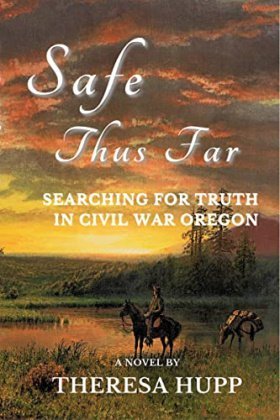“Scuttlebutt in town says he’s in Portland.”
“The sheriff knows to watch for you.” She would say anything, anything to make him leave.
“There ain’t no sheriff here now, is there?” Johnson pushed her into the parlor. “So we’ll close this door and have ourselves a nice chat.”
Jenny prayed Will and Maria stayed upstairs. She didn’t want them to find her with Johnson. He’d hurt them. She knew what he could do to young girls—she didn’t want Maria to suffer as she had.
Keeping a hold on her, Johnson looked around the room. “You got yourself a fine home. Musta done all right over the years, you and McDougall.”
“Do you want money? I don’t have any here, but I could get some in town,” she babbled. Anything to make him leave.
“Well, now, that might be nice. But first I want you to say you’re sorry for killin’ my pa.”
“I didn’t kill him—”
“McDougall did,” Johnson said, his fetid breath stifling her. “And he ain’t here. I’ll just take your apology instead.”
“I-I’m sorry. I never meant for anyone to get hurt.”
“Is that why you shot me?” he demanded, shaking her with his right arm. “See this?” He flapped his left arm. “This arm ain’t never been much good since you put a bullet in it.”
“I’m sorry.” Jenny meant it. “Truly sorry. But you were going to—” She couldn’t even say what he’d been going to do to her then.
“I was gonna what? Have a little fun?” Johnson leered. “That weren’t worth maiming a man, was it?”
“N-no.” What would it take to make him go away?
“Let’s start up now where we left it back in Missouri. Shall we?” He pushed her onto the divan and threw himself on top of her.
She screamed.

Will rushed into the parlor. A man sprawled on top of Mama. Will pulled at the man’s shirt. “Get off her. Get off!”
The man turned from Mama and grabbed Will’s neck, slamming him into a wall. “You little bastard.”
It was that Johnson fellow from town. Pa told Will to keep him away, and now Johnson was in the house. Will had failed his father. He flailed, trying to land a punch. Johnson crowded close to Will to avoid the blows and squeezed Will’s neck with one arm.
Only one arm, and still the man could choke him. Will saw stars. Though his hearing dimmed, Will heard Mama yelling and beating on Johnson’s back.
“Leave him alone—don’t hurt him,” Mama cried.
Will struggled. He had to protect Mama.
Maria screamed from the doorway.
“Don’t hurt him,” Mama shouted. “Don’t! He could be your son.”
Johnson’s grip slackened, and Will slumped to the floor.
“My son?” Johnson kicked Will. Will gasped for air through his bruised throat and stared at Johnson, who stared back.
Then Johnson chortled wickedly. “Or my brother?” He grabbed Mama’s chin and forced her face close to his. “Or your brother?” he said, grinning.
Will didn’t understand. His father? Or his brother? Or Mama’s brother? How could this man be any part of them?
“Yes,” Mama whispered. She seemed to shrink.
Johnson cackled uproariously. “You little bitch.” He pushed Mama, and she staggered. “You took my kin away with you.”
“He’s mine,” Mama said, regaining her feet and thrusting her chin forward. “Not yours. You can’t have him.”
Johnson snickered. “We’ll see about that.”
“You better leave, mister. Or I’ll shoot.” Maria’s voice dripped icy calm. From his position on the floor, Will saw she had Pa’s rifle trained on Johnson. Briefly, he wondered if it was even loaded. He’d never seen Maria shoot anything. Could she do it now? But watching her face, he thought she might.
Johnson raised his hands. “Well, now,” he said to Mama, “like mother, like daughter.” He sidled toward Maria, “Don’t worry, little miss,” he said, “I’m leavin’.”
Maria backed away from the door to let him pass, but didn’t lower the rifle. Johnson passed inches from the barrel, and Will feared Johnson would attack her. But Maria didn’t flinch.
“I’m leavin’,” Johnson repeated, and he slunk through the door. Maria slammed it behind him and turned the key.
With the terror over, Will blurted, “What did he mean, Mama?” He still couldn’t understand what Johnson had said. Then it dawned on him—Mama had had intimate relations with that man. And others. That’s the only way the man’s words made sense.
“Mama,” he said in horror, “were you a whore?”
From the hallway, Maria gasped.

























